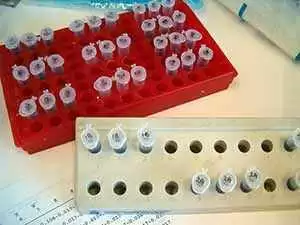
Celiac.com 11/26/2012 - I speak to many people from across the country, and internationally, who contact me requesting help. The issues they face are summarized into three categories:
- individuals with celiac disease who do not have their disease under good control;
- those with gluten sensitivity who remain less than healthy despite their gluten-free diet;
- individuals, and this is a big one, who are convinced that they have a gluten problem, due to self experimentation, but who are unable to get any corroboration or support from their doctors.
Having been immersed in this field for almost twenty years, it is frustrating not having a laboratory test that will reliably state whether someone has celiac disease or if gluten sensitivity has been ever present.
Celiac.com Sponsor (A12):
The good news is that this situation has improved. It’s not perfect, but it’s better than it has been, and I wanted to share this data with you and those you care about.
These newly available tests can have a big impact on those who need a diagnosis, as well as those who are already gluten-free but want to know why they are not enjoying the good health they desire.
I have no affiliation with either of the labs I mention so there is no conflict of interest in my recommendations.
The first lab, Cyrex Laboratories, is the newest lab specializing in gluten intolerance in the US. It currently offers four different profiles. There is a fifth one coming, hopefully very soon, that is also very exciting and a description of it follows.
I will provide the data that the lab lists in their brochure for each test along with my personal opinion as to its benefit and use. Here at HealthNOW Medical Center we have been utilizing these tests for almost five months—the lab just opened in January after three years of research and passing governmental licensing requirements.
Array 1: Gluten Sensitivity
“This is a saliva test which is recommended for patients who:
- Are suspected of having mucosal abnormality
- Have relatives with celiac disease
- Have type 1 diabetes
- Have autoimmune thyroid disorder
- Have relatives with autoimmune disorders, especially, multiple sclerosis, diabetes and arthritis.”
This is an easy screening test for those who wonder if they have gluten sensitivity or celiac disease based on their own symptoms or symptoms in their family. As a saliva test it’s very easy to perform (no blood draw is needed) and it’s the least expensive of all the tests offered.
When utilizing saliva, a test is only as accurate as the strength of the salivary immune system. Due to this limitation, the lab also measures this as part of the panel. In the past, labs would not include this measurement, sometimes resulting in false negative results—something we all wish to avoid.
Array 2: Intestinal Barrier Integrity Screen
“Intestinal barrier integrity plays a vital role in the overall health and well-being of patients. This blood test is recommended for patients who:
- Have gut dysbiosis, which appears to be resistant to standard therapy
- Are suspected of having intestinal mucosal damage
- Complain of food allergy and intolerance
- Present multiple symptom complaints (including chronic fatigue syndrome)
- Suffer from abnormal immune cell count and function (including autoimmune diseases)
- May suffer from depression or neuroautoimmunity [including such conditions as: thyroid disease, arthritis, myocarditis, dermatitis, endocrinopathy, osteoarthritis and pernicious anemia] ”
Healing a leaky gut is a very big part of regaining one’s health after a diagnosis of gluten intolerance. Gluten has caused damage to the lining of the small intestine and the presence of this damage is thought to be an initiator of the many “non-digestive” symptoms and diseases that are associated with gluten, including autoimmune disease.
Prior to this test two substances have been traditionally used to measure a leaky gut: lactulose and mannitol. The disappointment of the test lay within the sensitivity, or I should say lack of sensitivity, to adequately diagnose subtle leakiness vs. gross leakiness such as that found in advanced celiac disease and complete villous atrophy.
Much as an intestinal biopsy can miss the early and more subtle damage to the villi of the small intestine [its lining], so too does the lactulose/mannitol test seem to miss the more subtle changes in a leaky gut.
This test will detect increased permeability through the cells that line the small intestine, as well as increased permeability between the cells.
Clinically we use this test as a gauge of how we are progressing clinically rather than as a first tier diagnostic tool. There is no sense in measuring a leaky gut when it’s obviously there. But to prove that a clinical program is producing results or to perhaps show a less than compliant patient that their indiscretions are creating problem, this is an excellent test.
Array 3: Comprehensive Gluten Sensitivity & Autoimmunity
“To broaden the view of celiac disease and gluten sensitivity, our doctors can better diagnose the disorder by assessing antibody production against an array of protein, enzyme and peptide antigens. This blood test is recommended for patients who:
- Have gut dysbiosis—poor probiotic balance
- Are suspected of having intestinal mucosal damage—this means damage to the lining of the small intestine
- Complain of food allergies
- Complain of chemical hypersensitivity
- Present multiple symptom complaints (including chronic fatigue syndrome and Fibromyalgia)
- Suffer from abnormal immune cell count and function
- May suffer from depression or neuroautoimmunity [see below]
- Neuroautoimmune patients to consider: thyroid, arthritis, myocarditis, dermatitis, endocrinopathy, polyendocrinopathy, osteoarthritis and pernicious anemia”
This panel is the broadly inclusive blood test designed to measure both celiac disease and gluten sensitivity. Because this test measures several aspects of the protein structure (rather than just the single protein fragment heretofore analyzed), we believe it will take many of the false negatives out of the picture—certainly a welcome change.
Despite feeling better when removing gluten from their diets, patients like to confirm their own experience with a third party lab test. In the past, lab tests were so riddled with false negatives that we had to encourage patients not to discount their personal experience with a gluten-free diet, despite the absence of correlation with the lab test.
This approach was not always successful and at times patients returned to gluten simply because they had no lab test to verify the truth. Inevitably they would return to us many months later, feeling worse than ever and ready to, once again, look at a gluten-free diet.
This panel is more sensitive and specific than any we have had in the past, thereby reducing false negatives greatly. A patient does have to be consuming gluten for this profile to be accurate.
Array 4: Gluten-Associated Cross-Reactive Foods
Complete normalization of gut lesions is very rare in adult patients with celiac disease (8%), despite compliance with the gluten-free diet. This may be due to cross-reactions with an array of foods. This blood test is recommended for patients who:
- Have gluten sensitivity or celiac disease.
- Are non-responsive on a gluten-free diet—in other words don’t feel better.
- Have gut dysbiosis [not enough healthy bacteria and too many unhealthy ones], which appears to be resistant to standard therapy.
- Have an autoimmune disorder.
This panel is very exciting and we are already seeing a dramatic impact on our patients. When one has eliminated gluten (and often dairy) from one’s diet, it obviously takes a big commitment. The last thing such a person might want to hear is that there are other foods they may also need to eliminate.
Consider this: What if a temporary dietary change of eliminating foods that are confirmed as problematic on a laboratory test resulted in the difference between continued ill health and good health? Now, perhaps, it sounds like a good idea.
That is exactly what we found in patients who were being extremely vigilant about their diet but still felt “glutenated” or just ill and the cause was not being found.
Cross-reactive foods are foods with a protein structure similar to gluten’s that, upon ingestion, confuse one’s immune system into thinking that it has ingested gluten. The proteins are confused, one for another, and the reaction is as negative as if one has consumed gluten. This panel looks at twenty five possible foods (mostly in the grain and dairy families) to which one could be experiencing a cross-reactivity reaction.
While it definitely takes a further commitment to confront more dietary change, our current patients consider it well worth it based on their health improvement.
Finally, Array 5 that is not yet released, will focus on possible autoimmune reactions occurring from gluten. Autoimmune diseases can be “in the works” so to speak for well over a decade before the body experiences its first symptom. As the third leading cause of death in this country and with no known cure, any forewarning of autoimmune activity would be an excellent tool.
This test provides another much needed tool for those patients who, although know they are gluten intolerant, cheat on their diet with seeming impunity—meaning they don’t feel any ill effects from having done so.
Array 5 will be able to reveal what is occurring on a deeper level of the body such that the patient can see where gluten may be beginning to create autoimmune tendencies in certain organs or systems that he or she cannot feel.
The second laboratory I want to mention is Enterolab. Although Enterolab is not new, they are unique. A few things make them different from all other labs I know about:
- You don’t have to work with a doctor to receive a lab test. Enterolab works directly with the patient on-line. They will send you a test kit after you have paid them and test results are emailed to the customer.
- Enterolab uses stool testing for their celiac and gluten sensitivity panels. They have a unique technology that allows them to test for these conditions even if the patient has not been eating gluten.
- They offer genetic testing as well as testing for other food intolerances. Once again, no doctor referral is required.
I believe these tests offer benefit not only for those who need a diagnosis but also for those with a diagnosis who are not yet enjoying ideal health.
I hope you found this informative. Please do feel free to contact me regarding any further questions that you may have. Our clinic, HealthNOW is a destination clinic and we treat patients from across the country as well as internationally. We are here to help.
To your good health!









Recommended Comments